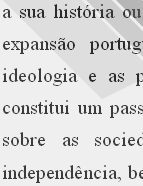

................................
The historical effort was not meant to serve history but to free the elements that could prove Portuguese rights concerning the domination of African territories and men. It was not a question of defining the knowledge of the past, but of giving an account of the ways of doing and speaking required for the implementation of the Portuguese colonial project, organising time and discourse, proposing historical periodisations, selecting events, choosing themes, considering only the most significant national or international problems of the nineteenth and twentieth centuries, even though twentieth century realities were absent in the writing of the historians.
As part of the general mythical framework, four 'historical truths', which were hardly original, served "in continuity" to organise the writing of the history of "Portuguese Africa", which consigned Africans to a space of silence without history, only broken by the civilising impact of Portuguese actions (Rego, O Ultramar Português no Século XIX [Portuguese Overseas Territories in the 19th Century], 1969, VII-VIII).
The first 'historical truth' was naturally that of the "pioneering role" of the Portuguese in the abolition of the slave trade and slavery, leading to the end of an archaic exploitation of the wealth and the enhancement of African territories. Two lines of reasoning dominated the writing to, firstly, exonerate the Portuguese of this crime which they had not committed, as they were not the inventors of the trade in "human ebony", since this responsibility fell to the Africans themselves who supplied the "merchandise" (Cunha Leal, O Colonialismo dos Anticolonialistas [The Colonialism of the Anticolonialists] , 1961, 65-66); secondly, to show the Portuguese position, centred around the "heroic figure" of Sá da Bandeira, in the front line of changes on a world scale (Rego, Idem, 62). It was no longer a question of the discoveries, but of returning to the Portuguese the pioneering role in the abolition of slavery "which we began to abolish when it was still being defended by England through the voice of its parliamentarians and statesmen" (Cordeiro, Questões Coloniais [Colonial Issues], 1934, 15).
The second and third 'historical truths' recovered the myth of the "multi-secular presence" in Africa, of the vested rights and non-legitimacy of the European claims over historically Portuguese territories, associated with the Portuguese "colonial vocation". Thus, the writing of colonial history focused on an African stage marked by multiple conflicts between the Portuguese and the other European powers, which after the Berlin Conference (1884-85) culminated in the English Ultimatum of 1890, an unacceptable blow to Portuguese "sovereignty". The Portuguese historiographical strategy used a panoply of historical facts to underline not only the long duration of Portuguese settlement and its consequent "historical rights", but also to introduce the Portuguese "civilising mission" and "colonial vocation".
